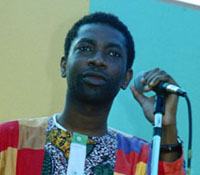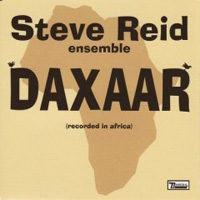
STEVE REID ENSEMBLE
DAXAAR (Domino Records DNO165)
This album made a couple of UK critics' top ten lists last year so I was pleased to get it & hear the whole thing. It starts out like a mellow West African kora album but before long it has switched into a solid jazz groove in the Miles jazz-funk zone. I don't listen to much Miles Davis anymore, because back in the old days when I had a small record collection I played "Hush/Peaceful" almost daily, and some records are so engrained on your consciousness you don't really need to listen to them again. Just saying "Love will tear us apart" or "Spotlight kid" or "Elevator to the gallows" can trigger a Pavlovian response in your brain. Steve Reid's DAXAAR reminds me a bit of that era of Miles, but it's original and engaging enough for me to recommend it wholeheartedly. The subtitle is "Recorded in Africa" as if to say, Well yes, it sounds like New York, but it's actually Senegal. Reid was drummer on Miles' "Tutu" sessions; he also played with James Brown (on "Popcorn") and his music credentials include Motown (for Martha and the Vandellas' smash hit "Dancin' in the street"), Arthur Blyth's "Metamorphosis," the Apollo Theatre pit band, Marvin Gaye, and even Fela. He spent three years drumming in Africa; on his return to the US he was thrown in the slammer for not showing up to his draft board for the Vietnamese war. Recently he has played with the Sierra Leone Refugee All Stars. The mood of DAXAAR comes from the keyboards played by Boris Netsvetaev and the synth played by Kieran Hebden, neither of whom is African. The kora, trumpet, guitars and percussionist are, however, from the continent. After the long and moody "DaBronxKar" we get to another moodly piece (that's moody and noodly) "Big G's family" which starts with gender (hard "g"), the Balinese metallophone, then after the groove gets entrenched, some acid guitar blazes forth courtesy of Jimi Mbaye from Youssou Ndour's Super Etoile de Dakar. On bass is Dembel Diop who played with Omar Pene's Super Diamono, as well as Ouza et ses Ouzettes, one of the lesser-known great bands from Senegal. The Hammond organ wielded by Boris gives this album a classic sound, it reminds me a bit of the Hank Jones & Cheikh Tidiane Seck album Sarala I love so much. Yes it is a bit dated in a jazz funk bag, but there is plenty of experiment and spontaneity to keep you coming back to it.
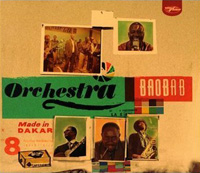
ORCHESTRA BAOBAB
MADE IN DAKAR (World Circuit WCD078)
Orchestra Baobab serves up 11 choice cuts of prime Senegalese soul. Originally they took griot songs and Latin covers and brought them into a modern Senegalese idiom, forging a unique sound, which has cantering rhythms, great harmonies, soaring vocals, exquisite filigree guitar leads and jazzy saxes, all in one sweet package. "Papa Ndiaye," the classic opener, was first heard on BAWOBAB 75 (though it had been in their repertoire since 1968). "Beni Baraale" is a cover of a Bembeya Jazz song, & goes back to the roots of Baobab when some of the members played in the Star Band de Dakar, and a memorable night in 1969 when they shared a bill with Bembeya. Assane Mboup, one of Youssou's protégés steps up for "Nijaay," a reworking of a song by Laye Mboup with a bustling arrangement by Attiso who can be heard off in the corner soloing madly. (In fact he even throws a bit of Bach's D minor Fugue at it!) "Ami kita bay" is also new to me, though it has the familiar Baobab ingredients, as mbalax and salsa meet on the dancefloor. "Cabral" (Homage to Guinean freedom fighter Amilcar Cabral), which uses the "Guantanamera" changes, is one of their most enduring songs. It has been anthologized thrice before: Günter Gretz put it on ROOTS & FRUIT (Popular African Music ADC304) in 1999; the Sheer Sound compilation in their African Classics series led off with it, and the Oriki Music disc "A Night at Club Baobab" also featured it. "Sibam," the busy number which follows it, was on the Sheer compilation, as well as ON VERRA CA, the World Circuit compilation that collected the 1978 Paris Sessions. Thirty years later it's hotter than ever, with sabar and tama drums kicking it up a notch. There's an added trumpet solo: it's great to hear more rather than less brass instruments in the mix. There are some new songs in the classic Baobab mode, but it's another oldie that scorches the speakers: "Ndéleng Ndéleng," by Thione Seck. (Seck left Baobab to form Le Raam Daan, a band he still fronts.) Assane Mboup delivers this, sounding a lot like Youssou. Thio Mbaye's sabar drums are busily driving the dancers then Attiso steps up for a magical, inventive solo where he demonstrates how he can run rings around any guitarist alive. (The earlier 7.5 minute version, sung by Seck, can be heard on AFRICAN CLASSICS but it is a thin recording. Here they retain the big room echo, but it is a much more dynamic recording.) "Bikowa," a calypso by Issa Cissoko is a gorgeous ballad, with a hint of "Stormy Weather." Issa's alto playing is great. "Colette," the final cut, dedicated to Attiso's wife, is another slow swaying dance groove, with a hot trombone solo. Attiso teases little moans out of his ax, dedicating the song to Carlos Santana.
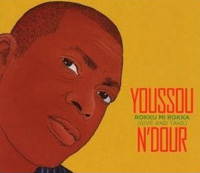
YOUSSOU NDOUR
ROKKU MI ROKKA (Nonesuch 266044-2)
Somehow we got Youssou Ndour backwards. He hit big with his first solo albums, including IMMIGRES, and we felt privileged to see him open for Peter Gabriel, but then after THE LION he started to try to crossover to western audiences and when "Shaking the tree" came out a lot of us threw our arms up in despair. Instead of keeping up with Youssou we went back to his early career with Etoile de Dakar and spent a few years exploring his roots. In concert he was always great, when he had Etoile de Dakar backing him, and it was a treat to hear them and watch the big rubberleg dancing. So I just assumed he was putting out the real product in Senegal and sooner or later we would hear it again. It's true he still puts out albums in Paris but they are generally live in concert and therefore rehashes of older material. He has more "Greatest Hits" and "Best of" albums than any other African artist. He came out of his slump with the amazing EGYPT and now has returned after a fashion to the mbalax sound that was his launch pad. "Sama Gammu" is a classic, in fact it sounds familiar, so maybe some of this stuff did come out on cassette earlier. There's the added attraction of Bassekou Kouyate on xalam. By track 4, "Bajjan," we are back in the mbalax groove with great speedy tama. There are a few raving tracks that seem like they've been judiciously spliced in the studio, which is fine, though they always leave off or fade up at a great moment and you long to hear the unedited take. Interestingly, "Létt ma" (indecision)" sounds like a country and western tune. Sure Africans were listening to Jimmy Rogers in the 50s and Jim Reeves in the 60s, but it's surprising to hear the burl of the country guitar so well incorporated into the riff here. There's also a southern (hillbilly as opposed to country) feeling to "Daabaax," again with Bassekou Kouyate. Tell me I am crazy but I hear echoes of "Ode to Billy Joe" in this! Things fall apart. "Xel (think)" is a bit too much of a rock anthem and starts to unravel (even though the backup singers are from Orchestra Baobab), but then "Wake up (Africa calling)" derails the album for me. I wish he had left off that last rap track with Neneh Cherry: it totally kills the mood. Nevertheless, this is the best thing Youssou has done (EGYPT aside) for years.
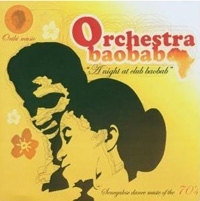
ORCHESTRA BAOBAB
A NIGHT AT CLUB BAOBAB (Oriki Music CD01)
Here's a treat. I am a huge fan of Orchestra Baobab and have their 7 CDs (including both versions of Pirate's Choice) plus the pre-final mix of Specialist in all styles, and six of their LPs. Three of my albums are by "Bawobab" from 1975 on the Disques BUUR label and they are the source material for half of this new compilation. However the advantage here is cleaned-up sound and the addition of equally rare tracks from two albums that came out on another French label, Musicafrique, Ndeleng, ndeleng and Un nuit au Jandeer in 1977-8. Though the sound is not ideal it is superior to most Senegalese recording of the time, which was generally done live in a club on a cheap cassette deck, by the sound of it. These recordings do seem to be board tapes and are not overmodulated. By now some of the titles are familiar, "Jin ma jin ma," has been rerecorded by the band on their Specialist album, but it's a thrill to hear the earlier version. Barthelemy Attisso is undoubtedly one of the most creative guitarists living. Then you have that great Latin-come-home beat and the vocals of Rudy Gomis, Balla Sidibe & Thione Seck, plus the great sax of Issa Cissokho. In addition to the Cuban flavour there are also folkloric tunes on here. One of their greatest tracks, "Cabral," which was included on Popular African Music's compilation ROOTS & FRUIT appears again here. Before buying this I asked a couple of record store buyers if they knew it and both said "it was just a reissue." I think they are confusing it with another Baobab reissue (black & white cover) called Classic titles, put out by Syllart, but this is stuff you probably don't have. Three of the tracks (1, 2, 11) come from Ndeleng, ndeleng (1978) and three from Un nuit au jandeer. "Saf mama den" was on Bawobab 75 (Disques BUUR BRLP 001 1975), along with "Sutukum," "Mansa," and "Am Saxul" which have previously been gathered. From Visage du Senegal (BRLP004) on the same label comes the funk-inspired "Kelen ati leen" & "Seeri koko." I've heard this latter, maybe live, with tons of echoplex and reverb on it, this take is a little more subdued but still breaks out. It has almost a reggae beat to it, perhaps best described as an African shuffle. Then there's a pair from Adduna Jaral Naawo (BRLP005) which has the smoky original of the song that became "Dée moo wóor." There's "Sey" from Gouye Gui de Dakar vol 2, and finally "Yolanda" from Gouye Gui de Dakar vol 4. This is truly a cherry-picked Best of the Rest compilation. Until the complete remastered Baobab boxed set comes along, I would say it is essential: the best African reissue of 2006.
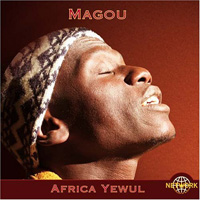
MAGOU
AFRICA YEWUL (NETWORK 495112)
Magou and his band Dakar Transit are a well-rounded group of musicians from Senegal who play light folk music and can also kick out the jams for a rocking groove. The title translates as "Africa wake up!" and is a call to Africans to stop fighting and sacrificing their children. The sound on this track is actually more samba and bossa nova than African. The rocker is "Ling ling (womaniser)" which says "He has photocopied his heart and never parts with the original." Although it is credited to Magou it is identical to an mbalax song by Africando. This is such a common occurence I can't be bothered to dig out the albums and compare them to find the original, but let's say he has photocopied the music for this one. Nevertheless it is a great groove. I hesitate about the middle of the album when he gets to "Gorée" which, despite the subject, is a lounge ballad in French and sounds like M.O.R. radio. In fact it's the lighter stuff that has me on the brink on this one. The band is accomplished but the sound is predominantly folk guitar with wispy vocals. I prefer it when they break out the tama & conga drums.
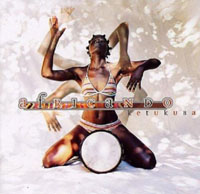
AFRICANDO
KETUKUBA (Stern's STCD1103)
African salsa was pioneered by producer Aboudou Lassissi and a series of albums he released on Sacodis in Abidjan in the 70s. The first Africando album, TROVADOR (Stern's 1993), was the apotheosis of the style and they continue to deliver consistently great music that combines the sound of traditional New York salsa of the 70s with great Wolof, Manding and other African vocals. I dont know how many volumes Africando are up to (uh, 15?), but, like Buena Vista Social Club, if you create a band of old-timers you are going to have a high attrition rate, and since Gnonnas Pedro has died, this latest volume is dedicated to him. Gnonnas was quite a phenomenon and had disappeared for a long time before Africando brought him back. I had the incredible CD La Combination de Gnonnas and the disappointing sequels, but then my friend Antuan gave me a couple of his LPs with his Dadjes Band (No, I am not putting them on EBAY) and I got the picture: this guy really was one of the greats. The title cut is a Gnonnas composition, the sound is consistent with the preceding albums, and if you like the Africando sound you will not be disappointed. There are great ticking timbales, big horn choruses and superlative vocals darting about on top of a hot mix. Occasionally they slow down so you can hear fine muted trumpet, tres, or Nelson Hernandez's tasty baritone sax. It says there are 10 original compositions, but there are two covers (Franco and Fania All Stars) and track 2, "Malawoo" is almost certainly an old Etoile de Dakar or Numero Un de Dakar number. Maybe they wrote new words to avoid paying royalties. Cuban legend Alfredo Rodriguez contributed piano to three tracks before his death. Continuity with Lassissi and the New York salsa of the 70s is maintained with the presence of Amadou Balake who sings the opener. I have one of his Lassissi albums (LS8-78) when he was into his James Brown period. But Africando is a showband with differing front men which keeps it vital. The novelty here is the appearance of the great Madilu, star of OK Jazz in the late 80s, who sings "Mario," the Franco epic about a gigolo. Twice as long as the other tracks, this time it has Luis Quintero on timbales to shake up the dancefloor instead of one of Luambo's jagged two-fingered leads. The mood shifts suddenly with balafon and a return to Senegal with Sekouba Bambino singing an invitation to dance. His "Fatalikou," a bolero in Wolof, is one of the highlights of the album. Newcomer vocalist Basse Saar from Senegal pours it on while Nelson Jaimes on muted trumpet adds a mournful counterpoint. At the midpoint it starts to build into a throbbing guajira. This new Africando is not only an homage to Gnonnas, it is a credit to his memory.

CHEIKH LO
LAMP FALL (World Circuit/Nonesuch 79938-2)
Its taken me a while to adjust to the broad scope of the new Cheikh Lô album. I guess he has been living the good life because you can feel it in the opening cut which has boulevard cafe accordion and is so mellow you are soon nodding out. It's a remake of a Bembeya Jazz oldie from 1973. Next up is the title cut which seems to go off at the wrong tempo, it's a jerky arrangement with sax and drums out of synch. The kit drummer is just banging away in his own hard rock-meets-jazz universe while everyone else is ornamenting the vocal. Weird. I am wondering if the album could have been sequenced better. "Xale," another reprise, is more on the mark with Lô's delicate vocal juxtaposed with good horn arrangements and well-balanced tama. About fifteen minutes into the album, the old Cheikh Lô delivers the magic we expect on "Kele Magni." But then another twist. Suddenly he's in Salvador da Bahia with the forty axé drums of Ilê Aiyê laying down a wall of sound on delayed reverb. There's great dubby trombone from Bocato and an electric guitar that sounds like an organ. He cuts back to a quartet for "Sante Yalla" which has Hilaire Penda on bass and Lamine Faye on guitar as well as two percussionists. "Pee Wee" Ellis, arranger for James Brown in the funky days of "Cold Sweat," is back on sax for "Toogayu Mbedd." Next up is "N'galula," a soukous song from the early 70s that was a hit for Elegance-Jazz, redone as funky mbalax. Lô is from Burkina Faso but has the Senegalese sound down cold. His band also turn in a credible reggae sound on "Bamba mo woor" with Pee Wee again, and Bigga Morrison on Hammond B3. There's a second version of "Kelle magni" with gratuitous synthesizer frills and another foray to Brasil with Carlinhos Brown's back-up singers to end. Like churrasqueria, the meat of this album gives you plenty to chew on.
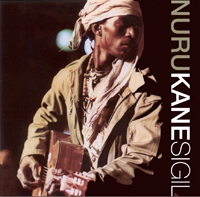
NURU KANE
SIGIL (TUGCD1041)
Here's another adventure in cross-border rambling. Nuru Kane comes from the Medina in Senegal but his spiritual roots are in the Gnawan music of Marrakech. To compound matters this CD was recorded in the Scottish borders on the banks of the River Tweed where I once spent an unmemorable summer in a tent keeping out of the rain. Spending a dreech day listening to driving rain and staring at white canvas is once way to attain samadhi, another is to listen to trance music. Multi-instrumentalist Nuru is an exponent of the guimbri, a three-stringed bass instrument made famous by Mahmoud Guinia and Mahjoub de Marrakech. A follower of Baye Fall (Senegalese disciple of Islamist Cheikh Amadou Bamba), Nuru is one of the Africans with dreads and patchwork clothing that signals their devotion. I believe the clothing migrates towards a solid colour (green or white) as the devotee progresses up the spiritual ladder to enlightenment. At least that's what I remember from my encounters with Sufis in Sudan. Moving to Paris, Nuru teamed up with other expatriates and created a hybrid of Senegalese and Gnawan music that is fresh and exciting. Thierry Fournel joined him on oud and guitar and Djeli Makan Sissoko contributed his n'goni and tama drum. Their group is called Bayefall Gnawa but this album is under Nuru's name and includes other musicians: producer Martin Swan on violin and accordion, and Penny Bont on Welsh flute. The Gnawan stuff is the strongest material on here but it gets diffuse on tracks like "Djoloff, Djoloff" where the violin doesn't fit. The album is almost all acoustic, however the folky guitar on "Talibe" is a bit too Frenchified for my taste, but overall there are some fine moments.
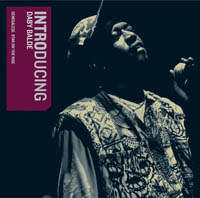
DABY BALDE
INTRODUCING DABY BALDE (World Music Network INTRO104CD)
Here is a sure-fire winner and the best thing to come out of Senegal in ages. Sure we get to see Youssou Ndour every couple of years, even Orchestre Baobab, but they belong to a style of music that is essentially Senegalese oldies. While Daara J and other youngsters are going in new directions there is still a place for great traditional music interpreted by younger musicians that is neither Mbalax, salsa, nor hip hop hybrids. Baldé is in his thirties and hails from Cassamance in the south of the country. Cassamance is situated between Gambia and Guinea-Bissau and is cut off from Northern Senegal. Historically it had extensive dealings with Portugal rather than France so has a unique musical heritage (remember Toure Kunda!?). Baldé was drawn to music at an early age but his parents objected so he went into exile, driving taxis in neighbouring countries while writing songs and learning to play guitar. His interest in the Fulani roots and culture of his homeland is paramount and he has begun to share his passion in concerts in Dakar and in Belgium. He sings in Mandinka and Wolof, as well as Fula, the choice of language calculated for maximum effect in the type of song he is performing. His electric band is augmented by Europeans on violin, accordion and sax and they blend nicely in with the kora, guitars and percussion. The fiddler is Wouter Vandenabeele who has a real affinity for the songs. Baldé has a fine voice and is an excellent writer and arranger. There's uncredited flute and good djembe playing on here. It's a mellow, thoughtful album and very engaging. Though his stated aim is to spread traditional music to young Senegalese, I predict he will find a widening international audience hungry for the same thing.
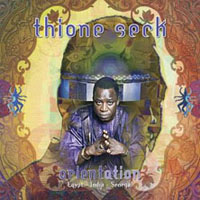
THIONE SECK
ORIENTATION (Stern's STCD1100)
An mbalax pioneer, Thione Seck is perhaps best known for his work with Le Raam Daan. While Seck is a huge star in Senegal and his cassettes sell well, outside Senegal his cassettes are hard to find and he remains in the shadow of his more famous compatriots. However I predict ORIENTATION will win him a new legion of loyal fans, as he has produced an album with a broader appeal that is likely to cross over to the wider Arabic world as well as fans of world music fusion. Yes, world music fusion is a dicey arena. I always wince when I hear about collaborations like those you typically see on Peter Gabriel's RealWorld label where Celtic fiddlers and Venezuelan harpists and Chinese flute players meet to lay down tracks. Not that the results are always bad, but like an ostrich omelette they are always a surprise. Last year Youssou Ndour surprised us when he recorded with a big Egyptian orchestra. Now we get Thione Seck's ORIENTATION where he goes a little further and includes Bollywood musicians in his mix and the result is a genuine triumph. Before you accuse Seck of jumping on Youssou's bandwagon, and attempting to upstage his old rival from their Etoile de Dakar and Star Band de Dakar days, be aware that Seck has been working on this album since 1999 and it was finished three years ago. Seck has always had an interest in Bollywood music as well as the closer-to-home sounds coming out of Egypt from the likes of Oum Kalthoum or Abdel Halim Hafez. He travelled to Madras to record with local musicians and you sense the looming presence of Kishore Kumar in some of his vocal swoops. Opera-like and intense, the CD keeps peaking. It's appeal is potentially broader than Youssou's recent EGYPT and it certainly deserves a place alongside it as a triumphant breakthrough for African music in the 21st century.
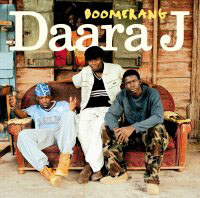
DAARA J
BOOMERANG (Wrass 105)
Regular readers know I consider French rap to be one of the tortures of Hell so I amazed myself by enjoying the latest release from Daara J called BOOMERANG. (They missed a great opportunity to call it Daara J. BOOM D.A.) The group is from Senegal which has over 3000 rap groups, so I guess it's the happening thing. It's not all good but the first two tracks really impressed me and it's the first time I have listened to an entire album of African hip-hop more than once. Of course I do tend to shut out the rapping parts but the arrangments are more than interesting. "Bomerang" is good and the next track "Esperenza" is catchy. Track three is where I begin to have problems. A pastiche of Bob Marley lyrics is not a reasonable excuse for a song. By track 8, "Hip hop civilization," it becomes quite irritating. There's a reprise of "Esperanza" featuring Cuban maverick toaster Sergent Garcia, which serves to confirm that it is the best track on here. If you buy an album for one or two tracks check this out, otherwise wait for it to appear on a compilation.

THE ROUGH GUIDE TO AFRO-CUBA
(Rough Guide RGNET 1070CD)
The indefatigable World Music Network has launched another set of African covers of Cuban music under the title THE ROUGH GUIDE TO AFRO-CUBA. It's pretty irresistible -- the idea I mean. This joins several other compilations including AFRICAN SALSA on Earthworks, SALSA AFRICA on the Tinder label, and Syllart's compilation, AFRICAN SALSA RUMBA which was kind of a "Roots of Africando" set and is the only one of the four that doesn't feature Super Cayor.
The Earthworks compilation from 1998 showcased Senegalese salsa, in particular Pape Fall and Super Cayor de Dakar. There was a remix of Africando's smash "Yaye Boy." The four tracks by Super Cayor had appeared on Popular African Music in 1997 on the brilliant album SOPENTÉ. The Tinder compilation had a few plums, and dug out classics from Les Bantous and Gnonnas Pedro (who later resurfaced in Africando), as well as Super Cayor's "Xamsa bopp." Different tracks from Africando, Gnonnas Pedro and Les Bantous were found on the Syllart compilation which ended with Franco's classic take on Eddie Palmieri's "Café." Syllart also included Grand Kalle and Rochereau.
The new Rough Guide throws in a few Cubans for good measure, as well as some collaborations, Samba Mapangala with Patato, Manu Dibango with Cuarteto Patria. And once again they trot out the classic "Xamsa Bopp" by Super Cayor. Surprises? Well, the Super Eagles from the Gambia are pretty obscure. One of their albums came up on EBAY last year and went through the roof. Their song "Mandali" was covered by Africando. After they broke up the singer and guitarist formed Ifang Bondi. The good news, if you don't want to compete with the folks with more money than brains on EBAY, is that RetroAfric has a Super Eagles collection.
While this is the only one of the four compilations to include Cubans I think there's a case for just having Africans doing Cuban music as the theme of a compilation. The Lazaro Ros track demonstrates the deep African roots of Cuban ritual music, but that's a whole different story. The E.T. Mensah track is rather slight. I'm not knocking this compilation for, if anything, it sounds a lot like a radio set I might put together and it's nice to hear someone else do it, though about halfway through I would have thrown in African Jazz, African Fiesta or Les Bantous and gone off in another direction.
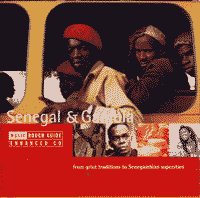
THE ROUGH GUIDE TO SENEGAL AND GAMBIA
(Rough Guide RGNET 1060CD)
A focused view of some of the best contemporary African pop can be heard on THE ROUGH GUIDE TO SENEGAL AND GAMBIA. There's a good balance between folkloric pieces and electric pop. This Rough Guide kicks off with Cheikh "Rattling" Lô's hit about Senegalese youth. It also includes Baaba Maal & Mansour Seck's atmospheric "Loodo" from DJAM LEELI; the rocking "Nguisstal" by Le Raam Daan that kicked off the great Sterns' compilation STREETS OF DAKAR; Orchestra Baobab's spooky "Mamadou Bamba" from BAMBA; and Youssou Ndour's jamming "Letter" from an album called BEST OF 80S. If you don't have these albums, this Rough Guide will make you want to add them to your collection. This is not just one for the neophytes, it is a nice concentration of classic sound from the jalis of West Africa and those who have become superstars beyond their villages. So get your jalis here.
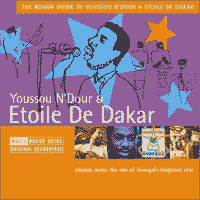
ROUGH GUIDE TO YOUSSOU NDOUR
(Rough Guide RGNET 1109CD)
Before I could distinguish Senegalese music from anything else I had a tape with a song called "Jalo" by Etoile de Dakar that slayed me. It wasn't long till I was hooked on the mbalax sound of Youssou Ndour and his band. I even met him and interviewed him on his first tour of the USA (in 1985 or 6), and found him to be modest as well as extremely talented. I am happy to see a compilation of his early work that, though it duplicates stuff I already have, is welcome because it doesn't attempt to do a BEST OF with Peter Gabriel and Sting mucking things up. THE ROUGH GUIDE TO YOUSSOU NDOUR & ETOILE DE DAKAR is subtitled "The rise of Senegal's brightest star" and draws from the four-volume set released on Stern's that you doubtless have (featuring that pirogue on the cover with the date Photo-shopped into the image of his name on the prow). But prowess is what he has in spades, to garble a coinage. The sound quality is not optimum on these tracks but the music more than makes up for it. As the tama drum drives the dancers doing the ventilateur, the lead guitar snakes up and down some Islamic scales and the warbly horns go off into their own call to prayer. The band had a relatively short life (with Youssou fronting) before the egos of the other vocalists, Mar Seck and El Hadji Faye, caused it to split in two. Youssou kept the name adding Super Etoile to it, while the others went for Star Band No 1, claiming to be the originators (the band had actually been formed in 1960 when Youssou was one year old). The redoubtable Graeme Ewens did the compilation and wrote the liner notes.
Youssou Ndour & Etoile de Dakar in concert (Click image for larger view)

SOULEYMANE FAYE
GUEW (Africando SYLAF 96070)
Souleymane Faye's album GUEW reminded me at first of Cheikh Lô's stellar outing BAMBAY GUUEJ. But that's good, right? He starts out like an American R&B or soul singer doing the "quiet storm," but it's not long till the mbalax-to-the-wall takes center stage. Lamine Faye of Lemzo Diamono on guitar also does the arrangements which have punchy brass and rock chord progressions. But those arrangements leave room for Faye's voice which has great feeling and the tama (talking drum). I haven't been impressed by the Lemzo Diamono material on compilations like STREETS OF DAKAR or SENEGAL COMPIL so it must be the presence of Faye that brings out their talents. You still have to put up with the synthesized flute solo and some other predictable pop elements, but the dynamics are varied and the singing and harmonies are strong.
Faye is the former singer of the Senegalese jazz fusion group Xalam and is considered the bad boy of Senegalese music. Raised on the street, he has walked away from success several times, blown recording contracts and quit bands, worked at Club Med and languished in Italian jails, but here he delivers what his fans knew he was capable of in a wide variety of styles with a lot of passion. At the end of the album we get a classic 12-bar rock raver, "Abdou Gueye," a bitter tale about an unemployed friend of the singer. No apologies for this: you can substitute Ray Charles or Sex Pistols lyrics and sing along, but there is a great bridge that twists up a key to show Lemzo Diamono have a few tricks up their djelaba sleeves.

